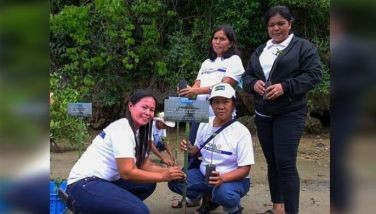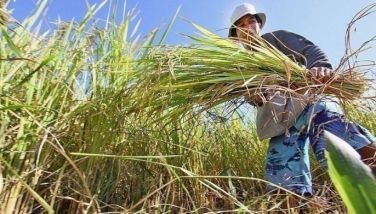New hybrid rice variety launched
Jardine Distribution Inc. (JDI), a leading crop protection company, launched recently a new hybrid seed variety called TH-82 in rice-growing areas of the country, notably Isabela, Nueva Ecija, Bulacan, Mindoro, Bicol, Leyte, Davao, Sultan Kudarat and Valencia.
JDI product manager Bobet Littaua said the new hybrid variety, developed by US Agriseeds, has been tested in several farms across the Philippines and consistently showed significant increases in yields.
“In most cases, yield increase of over 60 percent was achieved using the farmers’ current practices. TH-82 adapts well to local conditions because the variety was developed using tropical germplasms suitable to the country’s tropical climate, unlike earlier varieties which were developed using parent lines from temperate countries,” said Littaua.
According to JDI general manager Edwin Hernandez, TH-82 is expected to encourage more farmers to plant hybrid seeds and overcome their negative experiences with other hybrid seeds in the past. “Some of the early hybrids caused disappointment to farmers. These seeds resulted in empty grains or poor milling recovery, as characterized by chalky rice when milled,” said Hernandez, adding “this would probably explain the low adoption of hybrid seed technology in the country which is only estimated at six to seven percent.”
Problems have dogged the local use of hybrid rice previously, such as difficulties over government subsidies, susceptibility to pests and diseases of earlier hybrid varieties, and higher input costs which tended to discourage price-sensitive farmers.
However, with its ability to produce higher yields, hybrid rice develops efficiencies in land use for agricultural diversification and creates opportunities for rural employment, and is a resource for food production that needs to be promoted on a bigger scale.
Littaua said a key advantage of the hybrid TH-82 is in farm economics: it has the potential to generate up to P33,000 in additional profit per hectare compared to conventional inbred rice, with the profit computed at estimated value of harvest less total investment.
The investment in rice production covers seeds, land preparation, fertilizer, transplanting, irrigation, herbicide, insecticide and molluscicide use, threshing at harvest, labor such as raising seedlings and pulling, as well as other contingencies.
The product attributes of the new TH 82 hybrid rice seed include:
• Very high yield that reached as high as 10.3MT per hectare to date in trials;
• High milling recovery rate (Grade 1 – 67 percent);
• High head rice recovery (Grade 1 Premium – 57 percent);
• Sturdy, medium plant height (112 cm.) resistant to lodging;
• Low nitrogen requirement, with higher potassium needed;
• Tolerance to BLB and Tungro;
• Medium maturity (110 days);
• Shiny white grain; and
• 23-percent amylose eating quality.
“We believe that hybrid rice will continue to develop a greater role in pursuing local self-sufficiency, drawing lessons from higher crop volumes using hybrids in other countries,” said Hernandez.
“Using better hybrid seeds will continue to boost our rice production and lessen dependence on imports. As rice imports decrease, the stability of palay farmgate prices will improve. That is why introducing better hybrids is a priority effort of Jardine Distribution in the agriculture inputs sector,” he added.
- Latest
























